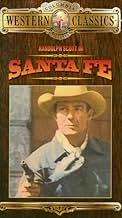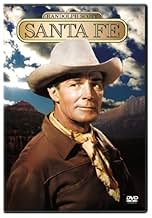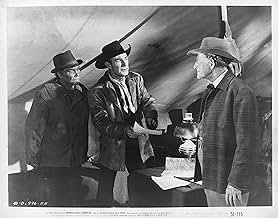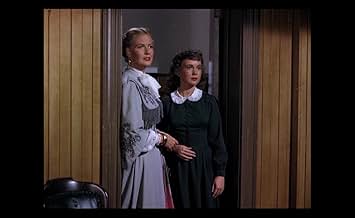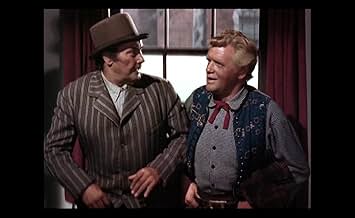CALIFICACIÓN DE IMDb
6.2/10
1.2 k
TU CALIFICACIÓN
Tras su servicio en la Guerra Civil, cuatro hermanos se separan, pero más tarde se encuentran en bandos opuestos en un enfrentamiento final.Tras su servicio en la Guerra Civil, cuatro hermanos se separan, pero más tarde se encuentran en bandos opuestos en un enfrentamiento final.Tras su servicio en la Guerra Civil, cuatro hermanos se separan, pero más tarde se encuentran en bandos opuestos en un enfrentamiento final.
- Dirección
- Guionistas
- Elenco
Peter M. Thompson
- Tom Canfield
- (as Peter Thompson)
Olin Howland
- Dan Dugan
- (as Olin Howlin)
Jock Mahoney
- Crake
- (as Jock O'Mahoney)
- Dirección
- Guionistas
- Todo el elenco y el equipo
- Producción, taquilla y más en IMDbPro
Opiniones destacadas
The time period for this film is actually pretty common for a Randolph Scott western--and about the fourth or fifth one set just after the Civil War. Like most of the films, Randolph fought for the South and now that the war is over, he has a choice to either accept the outcome or be a whiny jerk about it. Well, he's a smart guy and soon gets a job working for the Santa Fe railroad, but his three brothers who served with him aren't so bright--they hate the North so much that they do what they can to wreck things--even though there is no reasonable reason for this. So, much of the film pits Scott against his own kin (and vice-versa) as he tries hard to get the railroad completed and they work to undo it as much as possible--working for a traveling saloon whose task, it seems, is to both make money off the workers AND get them distracted from their job.
In addition to his brothers, Scott deals with a wide variety of things that might impede the progress of the railroad--rival companies, local Indian tribes and the like. This makes Scott's job in the film as a sort of trouble-shooter. How true all these problems were in the construction of the rails is beyond me and I assume that the writers took a few liberties...just a few! Overall, the film is pretty good. While it isn't among Scott's best films (they were made later in the decade and the early 60s), this is a good film from this time period.
In addition to his brothers, Scott deals with a wide variety of things that might impede the progress of the railroad--rival companies, local Indian tribes and the like. This makes Scott's job in the film as a sort of trouble-shooter. How true all these problems were in the construction of the rails is beyond me and I assume that the writers took a few liberties...just a few! Overall, the film is pretty good. While it isn't among Scott's best films (they were made later in the decade and the early 60s), this is a good film from this time period.
Good but not great old time shoot-em-up western. Typical Randolph Scott pic. Brother agains brother tale. Old North/South post-war conflict. Certainly worth the 90 minutes. Good for a rainy day or lazy afternoon watch. Lots of cliches, but all good cliches. Nice cinematography. Trains. Nice sets and costumes. Black hats vs White hats. Decent acting by a lot of faces you recognize but do not know the names. Very good flat car fight on the train at the end. Of course Randolph (white hat) prevails. Last line is a classic. "As the railroad grows, so will America. You darn tootin. Please enjoy if you get the chance.
A former Confederate soldier takes a job building the Santa Fe railroad after the end of the Civil War and tries to persuade his three brothers to join him, fearing they will otherwise fall into a life of crime owing to their enduring hatred of the North
It's another solid Randolph Scott western, which covers the railroad expansion of SantaFe. The railroad and its set pieces convey the hard work that was done quite well. The conflict is on par too, which has Indians, gambling tents and rival companies disrupting Scott's efforts to build a railroad - but his brothers, who have gone on the outlaw track, make things awkward for Scott, and as a head of the family he takes upon himself to stop them. Which leads to gunfights, and particular exciting train fight between Scott and Jock Mahoney. It's a typically enjoyable western that also conveys the treatment of southerners from carpetbaggers and such like after the civil war.
It's another solid Randolph Scott western, which covers the railroad expansion of SantaFe. The railroad and its set pieces convey the hard work that was done quite well. The conflict is on par too, which has Indians, gambling tents and rival companies disrupting Scott's efforts to build a railroad - but his brothers, who have gone on the outlaw track, make things awkward for Scott, and as a head of the family he takes upon himself to stop them. Which leads to gunfights, and particular exciting train fight between Scott and Jock Mahoney. It's a typically enjoyable western that also conveys the treatment of southerners from carpetbaggers and such like after the civil war.
Train Buffs will Enjoy this Stiff Account of the "Iron Horse" and its Celebration as the Catalyst for "Manifest Destiny" that would Not be Denied.
It's Not Cinemascope, but a Technicolor Film.
The Post Civil-War Story and the Bitterness is Threaded Throughout the Plot but goes Virtually Nowhere.
The Acting is Stoic.
The Comedy Relief is Labored.
The Action is Average Stuff when it Occurs, and it's Not Often.
This is a Good Example of the Studio System Entering the Second Half of the 20th Century Riding the Rails of Past Glories.
Laziness Resulted in Bloated Productions that Became more Product than Art.
The Fat-Cats in Hollywood would Drain the System for another 20 Years before it Finally Gave Up the Ghost.
1950 was about the Beginning of the Decline.
There was a Sense of Atrophy as the Movie Machine made its way after a Two Decade Ride of Full Control.
Thankfully Randolph Scott would Ride the 1950's Proud as He Hooked Up with Budd Boetticher.
Excellent Movie Entertainment that were Self-Produced.
It's Not Cinemascope, but a Technicolor Film.
The Post Civil-War Story and the Bitterness is Threaded Throughout the Plot but goes Virtually Nowhere.
The Acting is Stoic.
The Comedy Relief is Labored.
The Action is Average Stuff when it Occurs, and it's Not Often.
This is a Good Example of the Studio System Entering the Second Half of the 20th Century Riding the Rails of Past Glories.
Laziness Resulted in Bloated Productions that Became more Product than Art.
The Fat-Cats in Hollywood would Drain the System for another 20 Years before it Finally Gave Up the Ghost.
1950 was about the Beginning of the Decline.
There was a Sense of Atrophy as the Movie Machine made its way after a Two Decade Ride of Full Control.
Thankfully Randolph Scott would Ride the 1950's Proud as He Hooked Up with Budd Boetticher.
Excellent Movie Entertainment that were Self-Produced.
I remember that rather hilarious line from "Blazing Saddles", but I think this is the first film with Mr. Scott I've ever seen.
He was kind of the poor man's John Wayne.
The plot here is that the Civil War is over, and while his brothers carry around a lot of anger about what happened during the war, Randolf plays a guy who goes to work helping to organize and build railroads connecting the west with the rest of the country.
Some parts of the film, like the scene with the native Americans, and they remark "Some day we'll name a train after you, Chief." (Ha, ha, "Super-chief" How funny. Almost takes the sting off the genocide!) The brothers take to train robbing after gambling doesn't work out for them, and there's a bit of pathos between the good guys and bad guys and the historical Bat Matherson being dropped into the mix.
He was kind of the poor man's John Wayne.
The plot here is that the Civil War is over, and while his brothers carry around a lot of anger about what happened during the war, Randolf plays a guy who goes to work helping to organize and build railroads connecting the west with the rest of the country.
Some parts of the film, like the scene with the native Americans, and they remark "Some day we'll name a train after you, Chief." (Ha, ha, "Super-chief" How funny. Almost takes the sting off the genocide!) The brothers take to train robbing after gambling doesn't work out for them, and there's a bit of pathos between the good guys and bad guys and the historical Bat Matherson being dropped into the mix.
¿Sabías que…?
- TriviaAfter the Indian chief ran the train, Scott told the chief someday they will name a train after him. They did: the Santa Fe Super Chief.
- ErroresThe narration says Lincoln said "with malice toward none, with charity towards all" at Gettysburg. The quote is from his second inaugural address delivered at the capitol.
Selecciones populares
Inicia sesión para calificar y agrega a la lista de videos para obtener recomendaciones personalizadas
- How long is Santa Fe?Con tecnología de Alexa
Detalles
- Tiempo de ejecución
- 1h 27min(87 min)
- Relación de aspecto
- 1.33 : 1
Contribuir a esta página
Sugiere una edición o agrega el contenido que falta

